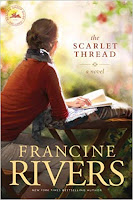 The Scarlet Thread, Francine Rivers
The Scarlet Thread, Francine RiversIn this book, Rivers weaves together two accounts. First, set in modern times, is the account of Sierra and her husband Alex. Brought together as childhood sweethearts they have now been married 13 years with two children. Alex has taken a job without her knowledge and decided to move the family to Los Angeles. Sierra is unwilling, negative and complains constantly. Her mother, a faithful Christian, tries to encourage her along the way but Sierra’s discontent is persistent. As Alex’s job takes off with much more money and a whole new range of friends, it is clear their lives are taking different paths.
Woven throughout are the writings of Mary Kathryn McMurray, one of the family’s ancestors. It starts with her childhood learning entries as her mother taught her, and moves to a journal as she records her life losing parents and siblings, marrying, having her own children, and setting out across America headed to the west in 1847.
Rivers has done a good job of having two stories with similarities but that are different enough to be interesting. Both women were very negative towards God and did not think that he loved them. Over time their hearts were changed, but it took tough circumstances to refine them. Mary‘s accounts show what life was really like in those early days as pioneers moved across the country: there were hardships, death and uncertainty. While Sierra does not face life-threatening situations, her struggles as she and Alex move apart, and as she comes to re-commit her life to the Lord, echo elements of Mary’s life.
It was an encouraging read and one that brought home the cost of following Jesus and discovering what forgiveness really means, yet also seeing the great joy and delight he brings in all aspects of life. Both women learnt to trust in God in all situations and to truly see that in all things he was working for good. Both had godly older women in their youth who encouraged them and taught them the truth which bore fruit in later years. There is an encouragement in reading books like this: they strengthen your faith, challenge your own convictions and remind us of what truly matters.







